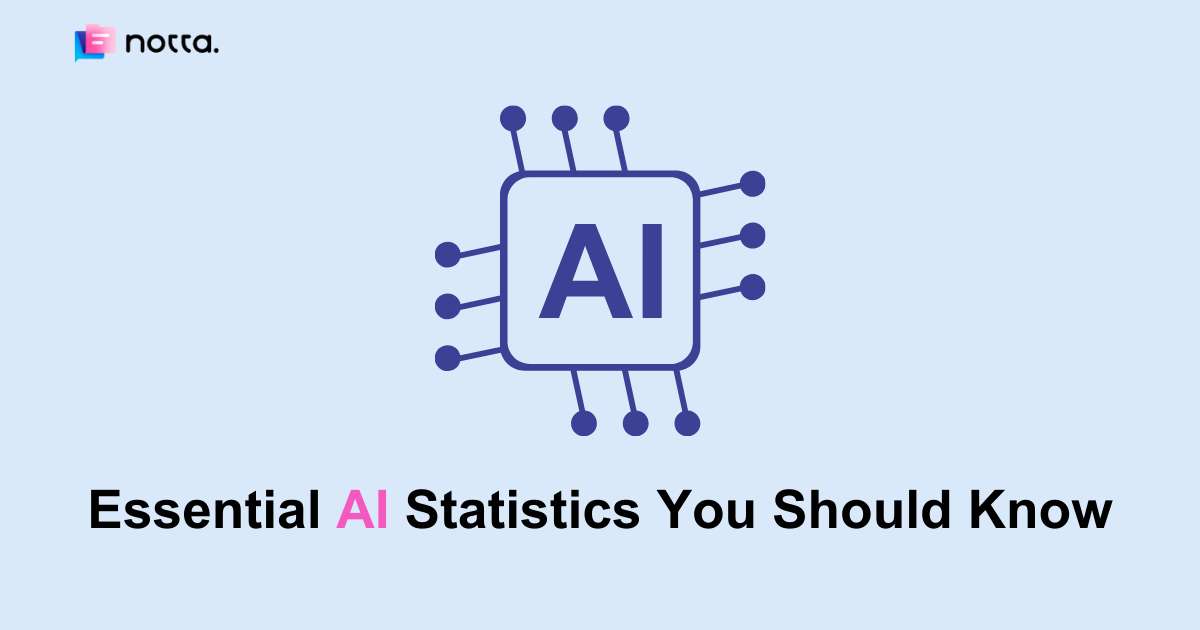
100+ Essential AI Statistics You Should Know for 2025
Record, transcribe and summarize conversations with one click.
When AI first came into the picture, many people started using it for fun — and soon, it became an important part of daily life. Today, many businesses are automating repetitive tasks by using AI in their workflow. Just like any other technology, AI is impacting and changing the way we work.
I've been writing about AI tools and developments for the last decade and have seen them growing. The things that were sci-fi a few years ago have become available to individuals and businesses. In this comprehensive article, I'll reveal the top 100+ AI statistics that reflect how AI is growing.
AI statistics top picks
AI is growing and shaping every industry. If you are not leveraging the power of Artificial Intelligence tools, you'll lose valuable time and money. Before I explain 100+ AI statistics in detail, here are my top picks.
Over 80% of businesses admit AI helps them stay competent in the market.
More than one-third of businesses use artificial intelligence (AI), and 42% are still exploring the technology.
A majority — or, most specifically, 73% — of people trust AI content, and around 34% admit they are worried about the technology.
Nearly 74% of company executives believe the benefits of AI outweigh the risks.
Over half of the employers admit AI might change the way they work.
Many marketers are using AI for basic content creation (76%) and for generating a copy (76%).
Most of the mobile users (or, most specifically, 97%) said they use AI voice assistants.
62% of workers believe AI will have a major impact on jobholders in the next two decades.
AI growth statistics
We all have seen AI growing, but AI-powered tools will have to go a long way before they can replace professionals — like writers, coders, or marketers — and steal their jobs.
1. The Artificial Intelligence market is likely to grow at a 37.3% CAGR rate from 2023 to 2030.
As a content marketer, I understand the importance of saving time by automating certain tasks — and that's exactly where AI can help. We all are living in a world where AI tools can work alongside us, but it can still be hard to predict the future of AI statistics.
A study by Grand View Research reveals the global AI market size is likely to grow at a CAGR rate of 37.3% from $196.63 billion in 2023 to $1,811.75 billion by the end of 2030.
This is primarily because of the increase in the practical use cases of AI technology, ranging from self-driving cars to content creation and more. While the current AI market is sizable, it's set to grow multifold over the next decade or so.
2. 87% of company leaders believe AI allows them to obtain and even sustain a competitive edge.
Frankly, if you don't integrate AI into your business strategies, there's a good chance your rivals will leave your business in the dust. AI supplements human intelligence (contrary to the belief that AI will replace humans) to make processes drastically more efficient and effective than they have ever been.
A survey by MIT Sloan Management of 2020 found that integrating AI with business strategy can help them set their business ahead of competitors. Here are some AI growth statistics that support the 'don't get left behind' sentiment.
87% of companies believe AI will provide them with a competitive advantage.
Surprisingly, 79% of participants believe new organizations using AI will enter the market.
78% believe Artificial Intelligence will help them move into new businesses.
77% of respondents said incumbent competitors will use AI.
72% said the pressure to reduce the costs will require them to use AI.
71% agree that suppliers will offer AI-driven products and services.
63% said customers will ask for AI-driven offerings.
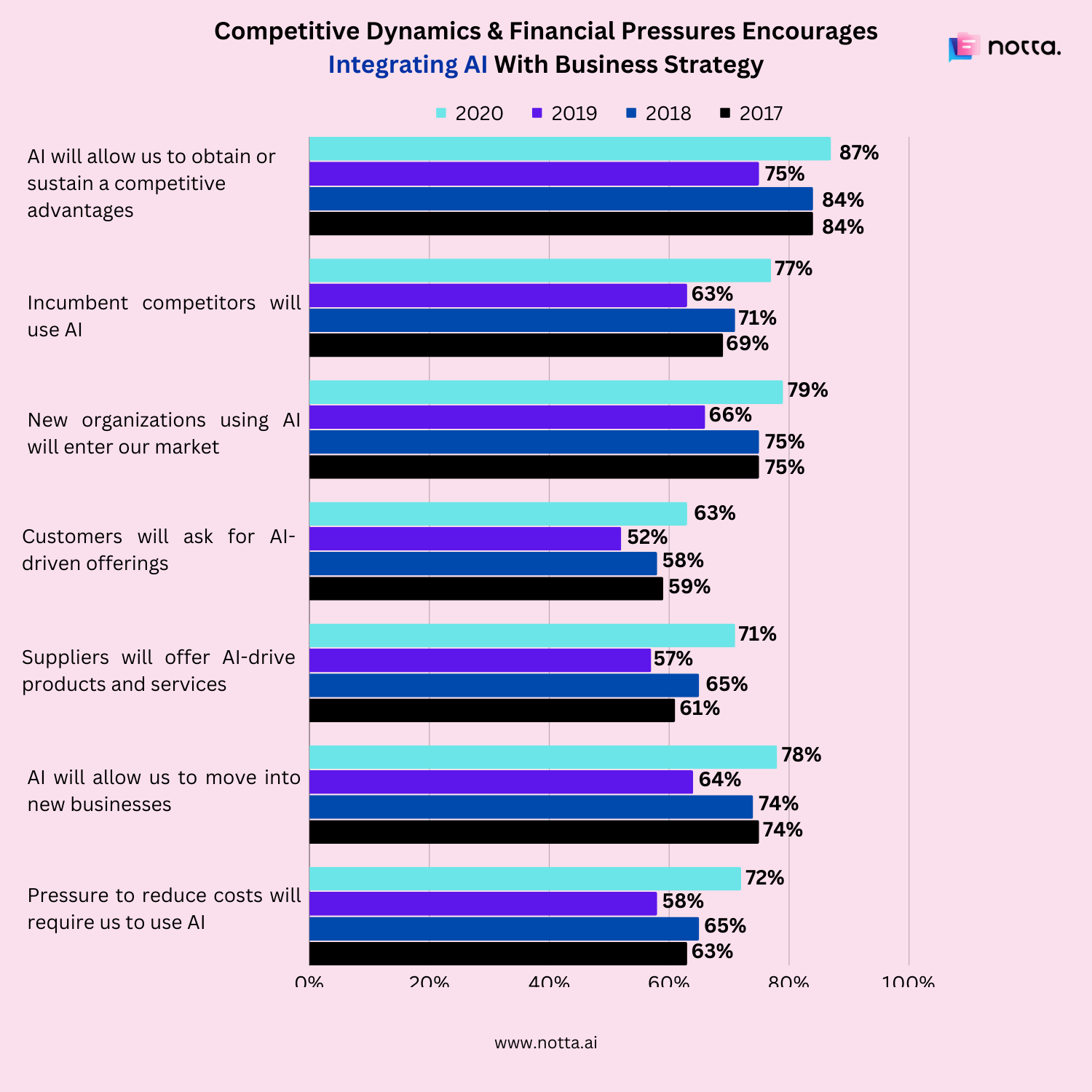
3. 66% of respondents believe AI-powered products and services will significantly change their lives in the next 3-5 years.
AI-powered services and products are increasingly present in the world around us — often in subtle ways. Ipsos surveyed 31 countries in 2023 to uncover the growth of AI and what users feel about the technology.
In the past, 49% said that AI-powered products and services have drastically impacted their daily lives in the past 3-5 years. When ChatGPT became the new member of the AI space, many major businesses integrated AI into their services and products.
For example, Grammarly has introduced GrammarlyGO — an AI writing (or editing) assistant built on GPT-3, and Canva created 'Magic Write' that can write a fast first draft of your copy. Amazon, for example, uses AI-driven recommendation algorithms to suggest new products to its users.
In a recent survey, 66% of respondents from major countries agree that AI-powered products and services will drastically impact their lives in the next three to five years.
AI usage statistics
Picture this: You and your team attend a lengthy meeting about a new product development. After you hang up, a transcript of the meeting is available neatly, which can be quickly summarized into shorter text — outlining the individual tasks assigned to team members.
These aren't the tasks completed by a hyper-organized employee but by AI transcription tools like AI transcription. Using AI tools helps you work faster, scale your business, and focus on the work that actually has an impact.
If you are still unsure if AI and automation can do that, here are a few statistics revealing how individuals and companies are benefiting from the tools.
1. 35% of companies are using AI, while 42% are still exploring the technology.
A survey conducted by Morning Consult and IBM reported that 35% of companies use AI for different tasks. When comparing 2021 and 2022 figures, businesses are 13% more likely to adopt AI in 2022.
IBM's report also reveals that 42% of businesses are exploring AI. (Note: Large enterprises are more likely to use AI than small businesses.) If you are unsure whether you should consider AI in business, here are some other AI statistics.
Over one-third of organizations polled in the IBM Global AI Adoption Index 2022 said they use AI as a response to many factors and pressures. While investments are growing in the AI sector, there are certain barriers that prevail:
34% said they have limited AI knowledge or expertise.
29% of businesses admit that prices of AI adoption are a bit on the higher side.
25% admit they lack the right tools and platforms to develop AI models.
2. 30% of IT professionals said their employees are using AI and automation tools to save time.
Artificial Intelligence has the potential to drastically reduce the time spent on repetitive and less important tasks — and focus more on high-value work that requires human attention.
For this reason, 30% of IT companies reported that their employees use AI — so humans can focus on more strategic roles while AI can do the rest.
3. Over half of the teleorganizations have invested in and deployed chatbots in business.
Chatbots increasingly have an AI (Artificial Intelligence) component and work better with improved speech recognition and sentiment analysis. 52% of teleorganizations confessed they have deployed chatbots, and 38% of healthcare providers said they rely on computer-assisted diagnostics.
4. Six in ten respondents are familiar with ChatGPT, but only a few have tried it.
AI is changing the way we work, and one of the most popular examples is ChatGPT. From automating networking emails to helping you write resumes, there are tons of ways AI can help you.
According to ChatGPT statistics from a Pew Research Center survey, 58% of US adults are familiar with ChatGPT — though only a few have tried the AI tool. These AI tools don't just streamline your tasks, but they also speed them up.
Out of 58% of respondents who have heard of ChatGPT, 19% confessed they had used ChatGPT for entertainment.
14% admit they used the AI tool to learn something new.
Only 12% said they have used ChatGPT for their work-related tasks.
5. Global Artificial Intelligence market is likely to cross $228.3 billion by 2026.
The global Artificial Intelligence market size is likely to reach $299.64 billion by 2026, representing a CAGR of 35.6% from 2021 to 2026. In China, the AI market is forecasted to reach $40.4 billion by the year 2026 at a CAGR of 39.1%.
7. Over 80% of executives believe Artificial Intelligence is a top priority in their business strategy.
It shouldn't surprise anyone that AI is becoming an important part of business growth — it's practically a tool that lets us speed up certain tasks.
I am a big fan of AI, especially when it comes to generating transcripts or summarizing texts. These AI-powered tools can help save a lot of back and forth from watching meeting recordings.
It's been a challenging time for businesses, with competition increasing with each passing day. The only way to stand ahead of the competitors is by adopting new technologies that help them survive — and thrive. Here are some Artificial Intelligence statistics revealed in a survey.
A majority of executives (84%) said AI will enable them to obtain a competitive edge.
83% of company executives claim that using AI is a strategic priority for their business.
75% of the respondents believe that Artificial Intelligence will allow them to move into new ventures.
The same report also reveals that AI technologies are projected to boost business productivity by 40% by the end of 2035.
8. 80% of companies will adopt intelligent automation by 2025.
9. 44% of business leaders prefer AI automation to boost productivity.
In PwC's fourth annual AI business survey, leaders were more geared towards using AI and its services. According to the survey, 36% of leaders or companies are planning to use AI and create a data fabric (an action-ready, 360° view of an organization's data).
44% of leaders said AI can increase productivity through automation.
41% believe Artificial Intelligence technology improves decision-making abilities.
40% said AI can improve customer experience, which eventually can boost sales and revenue.
40% of leaders believe AI can help innovate products and services.
37% believe AI technology can improve employee experience and skills acquisition.
36% said AI can develop new, data-driven business models.
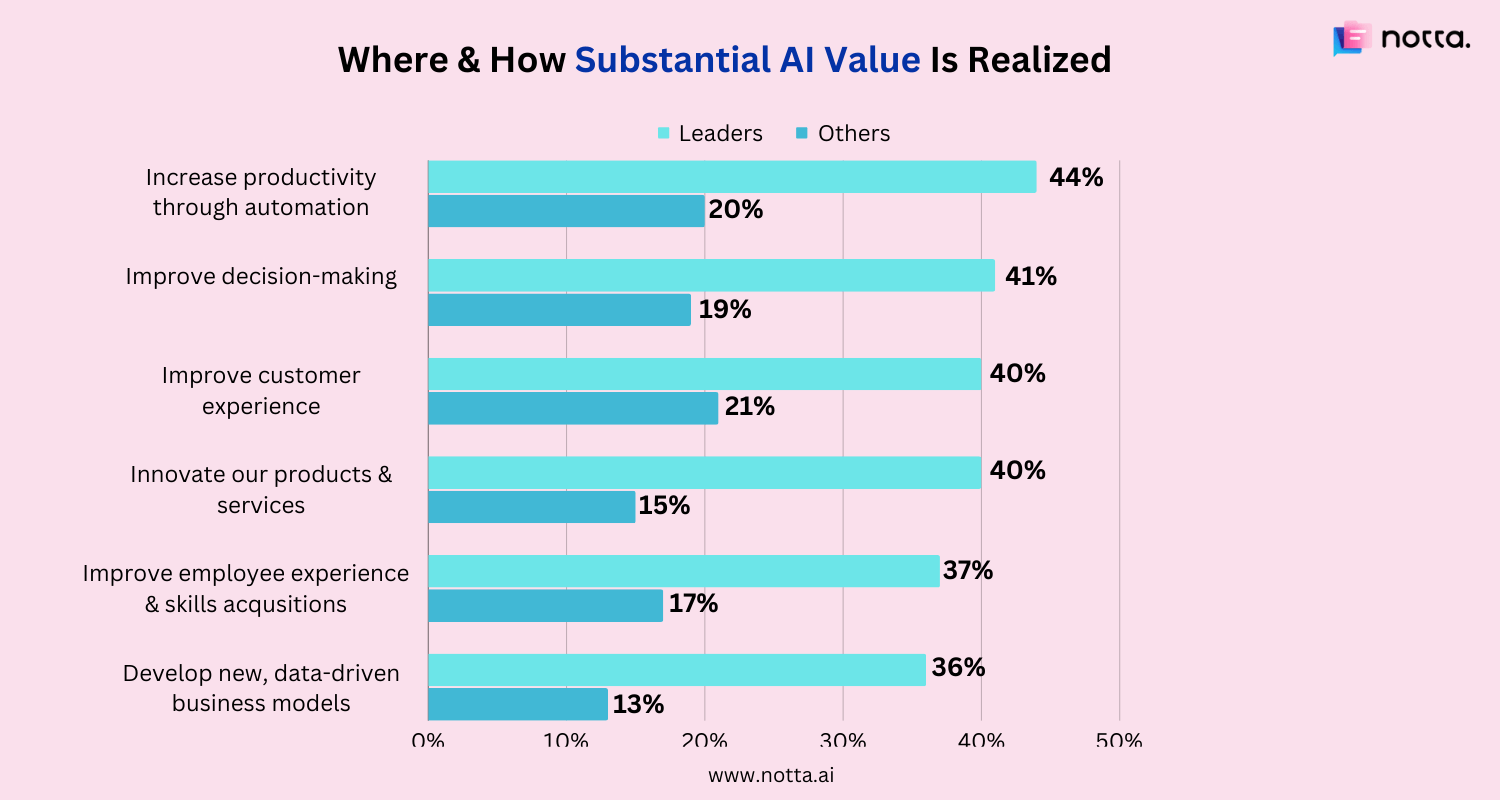
10. 42% of business leaders have implemented AI to reduce general hiring needs.
Let's be clear: hiring the right employees by checking thousands of resumes and condensing an entire resume into high-impact bullet points is no easy feat.
I would have easily lost hours staring at each resume if I had to check them and shortlist candidates. Thankfully, an AI summary generator will do most of the work for you and come up with a short text with relevant bullet points.
Many organizations are even introducing AI to streamline the tasks of hiring managers and recruiters. The automated applicant tracking systems (ATS) can automatically scan applicant resumes for the right keywords, hard skills, and soft skills.
A whopping 42% of organization's leaders have implemented AI with an aim to reduce general hiring needs and overcome talent shortages.
35% of leaders said they have a plan and will start to implement AI in their company.
16% of company leaders are still on the path to developing a plan.
Only 4% of the survey respondents do not plan to integrate AI, but 2% are not sure about their decision.
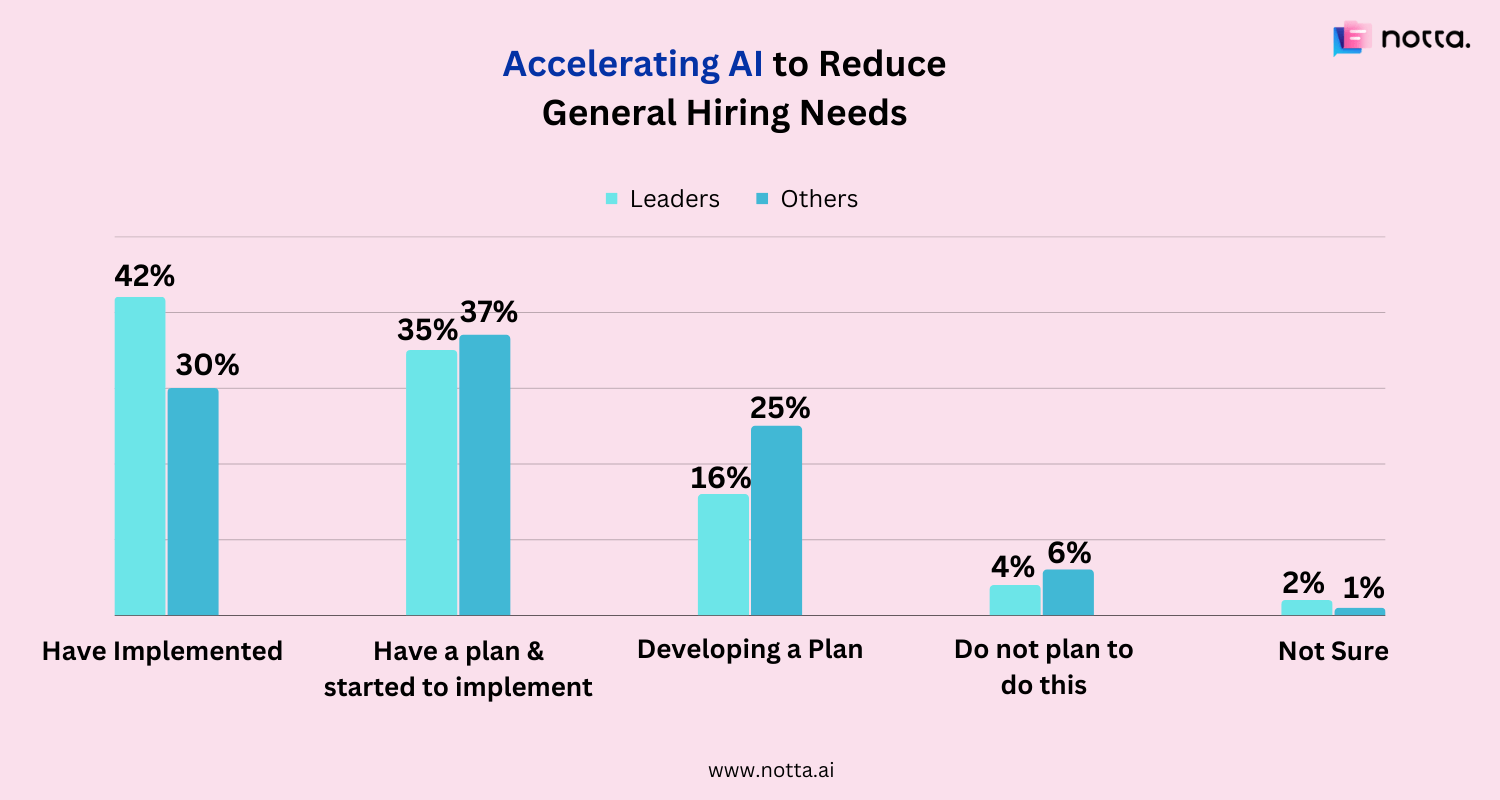
Notta offers the most integrated AI meeting notes, summaries, and action items so nothing gets missed.
AI trust statistics
Artificial Intelligence is a big new thing, and people are already coming up with countless ways to use it. While AI-powered tools are incredibly impressive, there are certain concerns and trust issues.
Let's check some statistics to see what the users have to say about these technologies.
1. 73% of consumers trust content written by Generative AI.
If you've been playing around with AI for a while, you've probably learned that AI chatbots only require some background information and context to generate appropriate responses.
People can create content using ChatGPT, and some are even posing threats by creating malware. When asked what people think about the content generated by AI tools, here is what they have to say.
Nearly 73% of consumers said they trust the content written by AI tools.
Over 67% even believed they could benefit from receiving medical advice from Generative AI.
Nearly 66% of respondents would seek advice from Generative AI tools on topics related to personal interactions or relationships.
Only 53% of consumers trust Generative AI-assisted financial planning.
2. Gen X (age 43 to 58) considers Generative AI content more trustworthy.
Most of the new-gen AI tools are pretty broad, from helping you write silly poems to auto-generate summaries — and everything in between. Here's what the AI statistics have to say.
74% of Gen X consumers trust content written by Generative AI.
73% of baby boomers aged between 59 and 77 years find AI content trustworthy.
73% of millennials and 72% of Gen Z trust content written by AI tools.
2. Many people are worried about Generative AI technology.
Generative AI technology can be incredibly powerful and useful, but not all Generative AI content can be trusted and relied upon. Since these AI tools are trained on human-created content, they sometimes produce racist, stereotyped, and harmful content on their own.
34% of consumers are worried about phishing attacks that use Generative AI technology to deceive individuals.
33% of consumers are concerned about the non-recognition or non-payment of artists and contributors whose work is used in the training of AI algorithms.
While there are many people who are concerned about these technologies, 49% of consumers are unconcerned about the fake content written by AI.
3. Many Americans have some level of concern about using AI.
In 2022, 38% of US adults were more concerned than excited about Artificial Intelligence applications in daily life. Only 15% were more excited than concerned. The infographic represents the High, Medium, and Low levels of concern about AI technology.
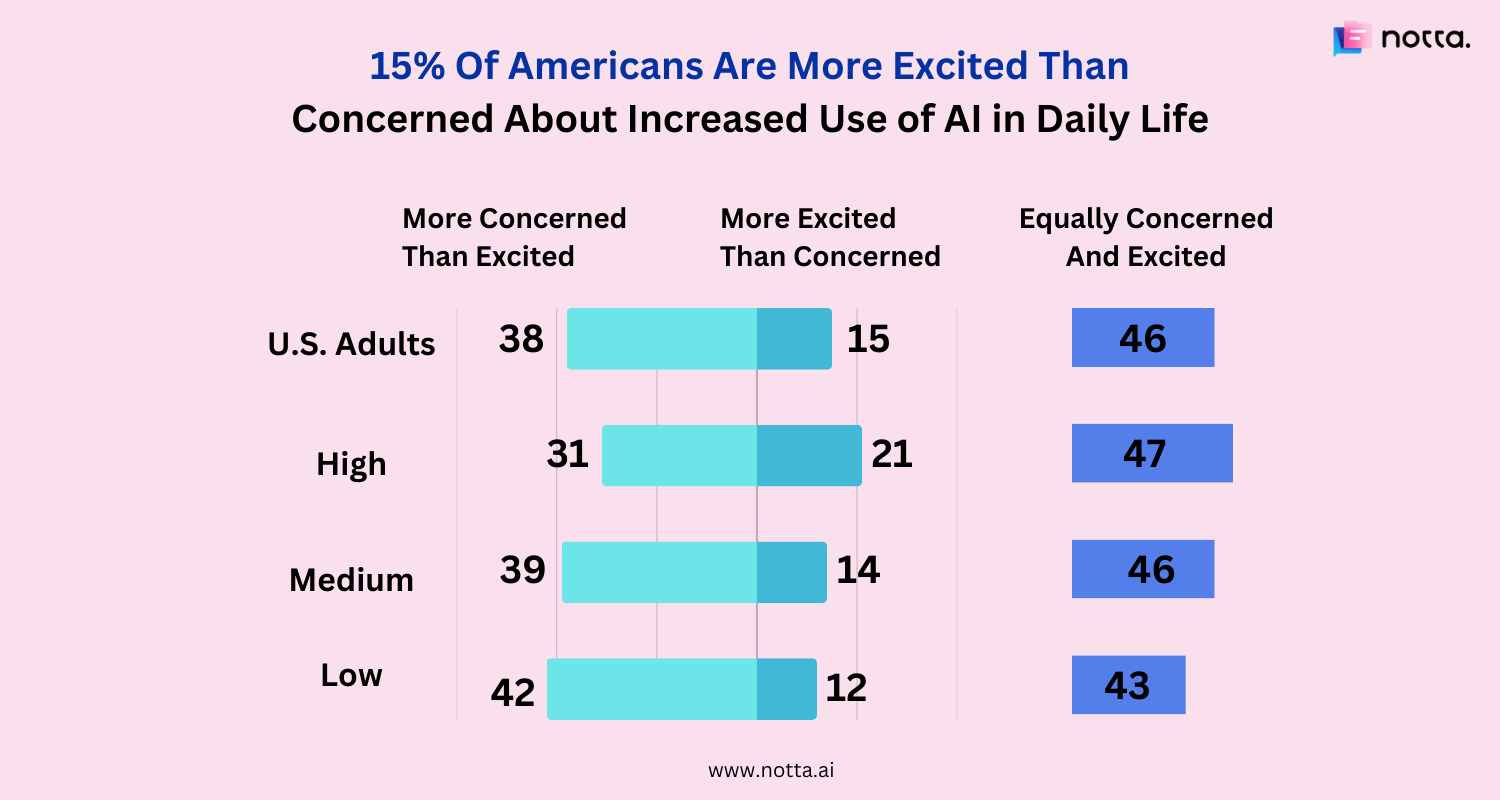
However, the latest Pew Research report reveals that the number of Americans who are concerned about AI has increased in the year 2023.
52% of respondents feel more concerned than excited, and only 10% say they are more excited than concerned.
36% of respondents had mixed feelings and said that they were equally excited and concerned about AI.
4. 74% of executives believe there are more benefits of Generative AI than the associated risks.
One of the big promises of Artificial Intelligence is that it may operate without human intervention. Users don't have to spend hours writing metadata for blog posts — AI writing tools can do it for you. While some of the Generative AIs can automate things for you — for the time being, you should be very cautious about letting AIs work unsupervised.
78% of organizations believe Generative AI will improve efficiency and streamline the design process.
71% of respondents said Generative AI helps create more interactive experiences for their customers.
5. Only 23% of US adults trust how Generative Artificial Intelligence is being used in social media.
Everyone is suddenly talking about Artificial Intelligence — and Generative AI in particular. The latest 2023 data from the Big Village reveals what respondents think about Generative AI and its use in social media.
66% of US adults are concerned about privacy issues involving Generative AI uses for social media.
60% are confused about how they can create Generative AI for social media.
Half of the respondents are also interested in learning more about how to use Generative AI in social media.
Nearly a quarter of respondents (23%) trust how Generative AI is used in social media.
6. More than half of respondents (57%) believe AI tools lead to discrimination and biases.
Ipsos surveyed US citizens to understand how AI tools create an environment of discrimination. Here are the results from the survey.
Nearly 65% of the respondents admit AI can cause harm.
Over half of the people said Artificial Intelligence tools might create discrimination or show biases.
A majority of respondents (70%) confessed AI can spread misinformation online.
AI and workforce stats
AI and automation seem like the future of work and are picking up pace. They have now reached a point where AI is useful in many fields.
Marketers, for example, can create advertising campaigns using AI — though sometimes the results aren't as effective as expected.
Here are some AI statistics revealed by the Ipsos survey:
1. More than half of respondents believe AI can change the way they do work.
In July 2023, Ipsos Global Advisor surveyed 22,816 adults from 31 different countries, including Canada, New Zealand, Thailand, Indonesia, Singapore, and more.
Around 57% of respondents said AI is 'likely' to change their current job by the end of 2028.
Over one-third of workers confessed that AI is 'not likely' to modify their current job in the next five years.
A small fraction of respondents (8%) said they are unsure about the future of AI.
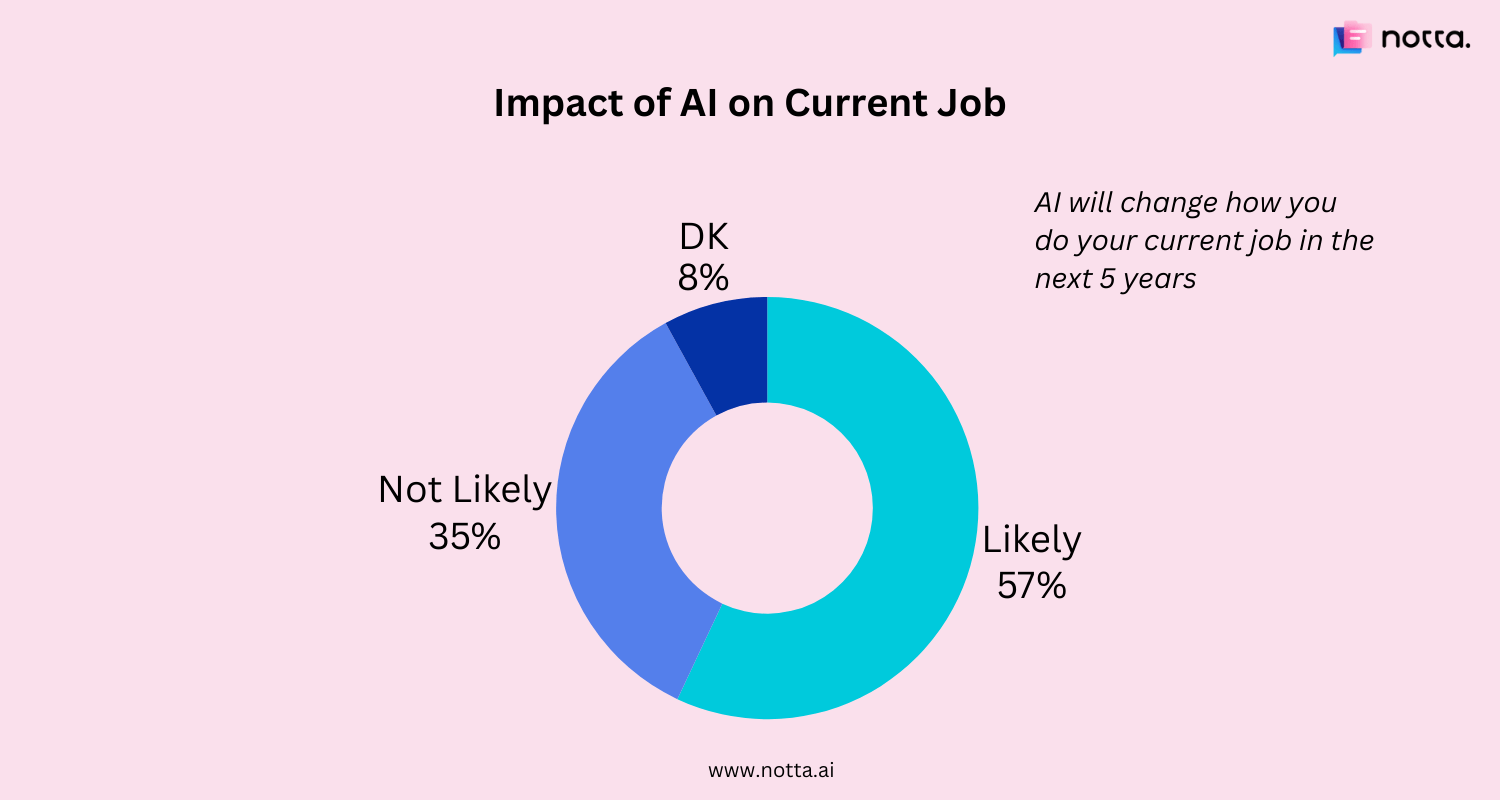
2. Over one-third of employees believe AI can replace them by the end of 2028.
AI can do a lot of tasks like recruiting new employees, automating repetitive tasks, and translating transcriptions from one language to another. That's why many workers fear they are likely to lose their current job to AI tools.
More than half of respondents (56%) believe AI is 'not likely' to replace the kind of job they do — at least not in the next five years.
Contrary to the above statement, 36% of employees feel AI is 'likely' to replace their jobs, whereas 8% of the workforce is unsure.
3. Many workers feel AI will have a negative effect on their jobs.
Nearly half of the white-collar (43%) and blue-collar (46%) employees believe AI might hurt their jobs as the technology advances. But that does mean AI cannot help the existing workforce — instead, 64% of respondents are hopeful that AI can help in the early detection of medical conditions.
4. Nearly half of the respondents confessed Artificial Intelligence can positively impact their jobs.
The Future of Jobs Report 2023 reveals that 49% of respondents admit AI might have a positive impact on jobs, whereas only 23% admit that advancing technology can negatively affect the state of current employment.
5. 2 in 10 US people will use ChatGPT at least once a month in the year 2024.
eMarketer held a survey of US citizens to understand their thoughts about AI chatbots and tools. The report reveals nearly 20% of the respondents will use ChatGPT once a month by 2024.
6. A majority of respondents (62%) believe AI will impact jobholders in the next two decades.
There's no doubt that AI has to go a long way before it can replace professionals. Nearly 62% of the workers think AI will majorly impact the workers professionally, and only 28% believe AI technology might have a significant impact on them personally. While there is a major portion of people who feel AI can replace humans and work independently, 47% believe AI can evaluate job applicants better than humans.
7. AI might disrupt 85 million jobs by 2025 and create 97 million new jobs.
AI can now work as a digital personal assistant by stimulating the experience of talking with another person. The AI-powered meeting schedulers can automatically book appointments with team members and clients — and the list goes on.
There are a lot of AI technologies and tools that can change things quite a bit, but stealing jobs seems like a dream. For example, AI chatbots may not replace customer service teams, but they certainly help in handling more customer support queries.
80% of executives are planning to digitize work processes and deploy new technologies in their business.
50% of employers expect to automate only a few roles in their organization using AI.
Shockingly, 43% of companies are set to reduce their workforce due to technology advancements.
41% of respondents are planning to expand their use of contractors for task-specialized work.
Contrary to the previously shared data, nearly 34% want to expand their workforce due to technology integration. This indicates both the positive and negative effects of AI and technology on the workforce.
AI and marketing stats
For marketers, AI can save huge amounts of data than they would spend on developing targeted campaigns and analyzing the results. AI also helps consumers by helping them see the content they like. Many companies are using AI to improve their day-to-day initiatives, whereas others are planning to do so in the future.
1. According to marketers, AI's powers lie in writing and content creation.
Marketers confessed that AI is good at pulling ideas from different corners of the Internet and helping them with some content marketing inspiration. It can also proofread the content to remove grammatical mistakes and help them come up with better ways to deliver the same message.
Let's get granular with some AI marketing statistics and see how marketers are using the technology.
76% use AI for basic content creation.
76% use the technology for creating content.
71% think AI inspires creative thinking.
Only 63% use AI to analyze market data and 62% prefer generating asset images.
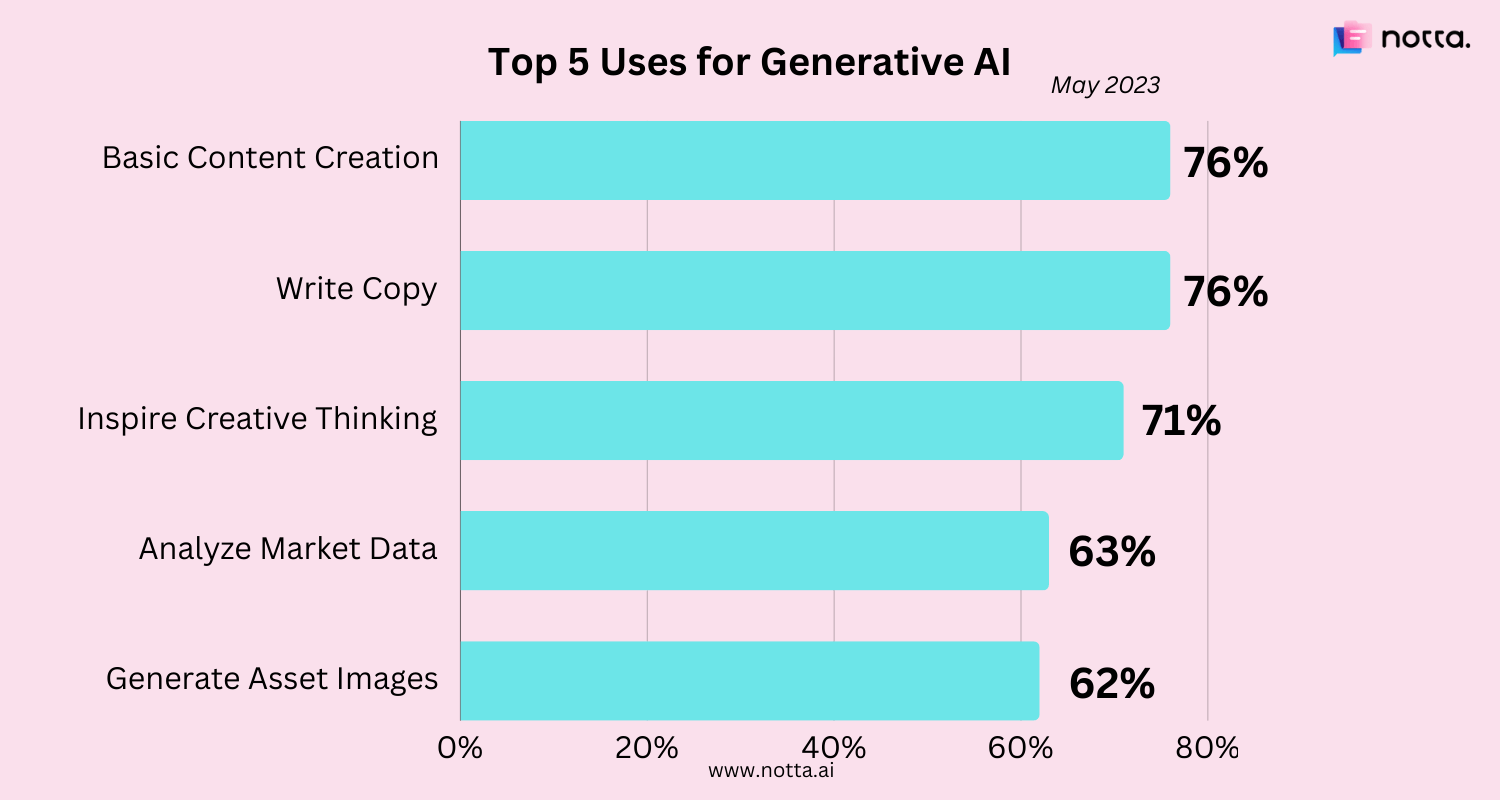
2. Consumers use AI for creative purposes, such as generating content (52%) and brainstorming (28%).
Many marketers feel that AI can be a handy tool when they are at a loss for words. While it isn't perfect, AI may provide an idea that can certainly get your creative juices flowing.
Insights obtained from the research reveal that over half of the respondents generate content using AI, and just 28% use it for brainstorming purposes.
3. 46% of executives said that they use AI for creating personalized marketing campaigns and communication.
Artificial Intelligence uses historical data to predict campaign performance and better optimize the ads for the audience. The information obtained from AI can make ads more relevant and personalized to the target audience.
AI can also help you scale data collection to uncover the audience's feelings and preferences. Marketers can use it to scrape the web, forum responses, reviews, and more and develop insights that improve marketing campaigns.
With Notta, you can easily generate meeting minutes, turning spoken content into written records with 98.86% accuracy.
AI voice assistant and smart speaker statistics
Digital personal assistants like Siri, Google Assistant, and Cortana operate using conversational AI. It works by stimulating the experience of talking with another person — a human. These voice assistants and smart speakers are gaining momentum, and here are some voice AI statistics that support the claim:
97% of mobile users admitted they are using AI voice assistants.
The number of digital voice assistants is expected to reach nearly 8.4 billion units by the end of 2024.
The Global market size valued at $8 billion in 2022 is expected to reach $49.53 billion by the end of 2032 — all thanks to the increasing demand for smart home appliances.
Many shoppers use voice search before, during, and after they make a purchase.
51% of respondents use voice search for research products, and 36% add products to their shopping list.
Nearly one-third of shoppers use voice search to track their packages.
22% use the AI voice search to make a purchase, and some (20%) provide ratings or reviews using this feature.
AI statistics FAQs
Is artificial intelligence growing?
Yes, the Artificial Intelligence market is expected to grow dramatically from 2021 to 2030. The global AI market was valued at $95.60 billion in the year 2021 and is likely to grow at a CAGR of 32.9% and reach $1847.58 billion by 2030.
What is the current state of AI adoption across industries?
AI adoption across industries has leveled off over the past few years. Back in 2017, only 20% said they had adopted AI in at least one business area. The latest data from McKinsey & Company uncovers that 50% of organizations — almost 2.5x higher than in 2017 — are using AI in at least one business unit.
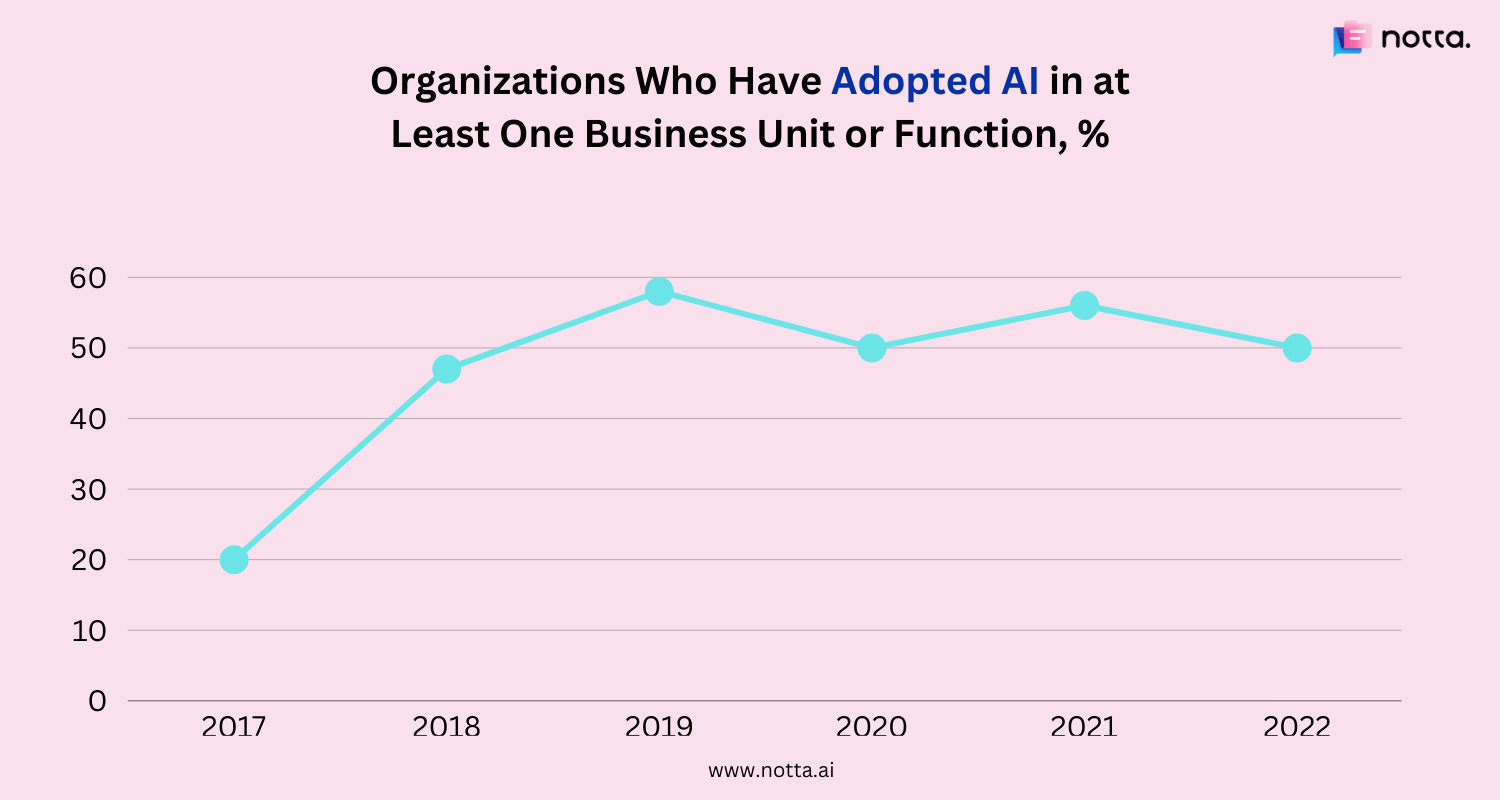
Do people trust AI statistics?
As time goes by, people are losing trust in Artificial Intelligence technologies. For example, in 2021, only 37% of respondents said they were more concerned than excited about AI. The figure was pretty similar (38%) in the last year (2022). But with multiple AI chatbots and tools launched every year, the figure has jumped to 52% in 2023.
How many companies use AI statistics?
Chinese and Indian companies are taking the lead in the use of AI compared to other countries. According to the AI statistics revealed by Statista, 58% of Chinese and 57% of Indian companies have adopted AI, whereas 30% of Chinese and 27% of Indian companies are exploring AI. Here's an infographic that reveals the rate of adoption and deployment of AI in enterprises globally.
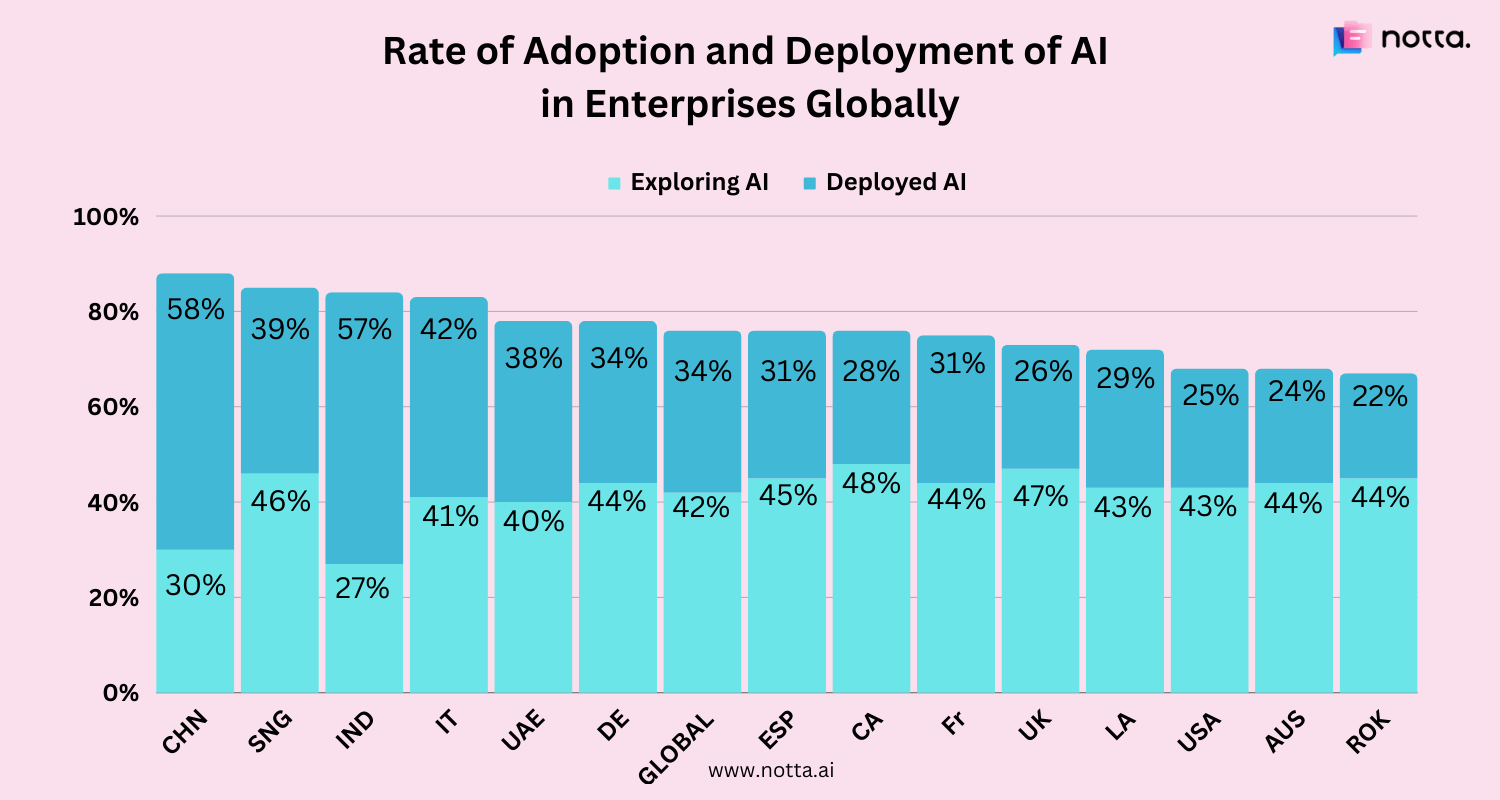
Will AI take over by 2025?
The World Economic Forum indicates that AI might replace 85 million job roles across the globe by 2025. Contrary to the study, The Future of Jobs Report 2020 suggests that AI tech might also create 97 million new job roles within the next few years.
Conclusion
Artificial Intelligence is rapidly changing (or revamping) the way businesses operate or individuals do their work. In a matter of years, it would be difficult to identify any business area that AI hasn't touched.
These 100+ AI statistics reveal the impact of AI on your job and business, and one thing is clear: AI is going to affect every field in some way. If you don't want to play a lot of catch-up down the line, it's time to embrace AI now.
References
Grand View Research: Artificial Intelligence Market Size, Share, Growth Report 2030
MIT Slogan Management Review: Expanding AI’s Impact With Organizational Learning
Gartner: Gartner Survey Shows 37 Percent of Organizations Have Implemented AI in Some Form
Pew Research: A majority of Americans have heard of ChatGPT, but few have tried it themselves
GlobeNewswire: Global Artificial Intelligence Market Size 2021 Rise at 35.6% CAGR, Will Grow to USD 299.64 Billion by 2026: Facts & Factors
PRNewswire: Global Artificial Intelligence (AI) Market to Reach $228.3 Billion by 2026
Analytics Insight: 80% of Companies will Adopt Intelligent Automation by 2025
Capgemini: WHY CONSUMERS LOVE GENERATIVE AI
Pew Research Survey: Public Awareness of Artificial Intelligence in Everyday Activities
Pew Research Survey: Growing public concern about the role of artificial intelligence in daily life
Capgemini: Generative AI in organizations | Research & insight | Capgemini
Insider Intelligence: Generative AI Chatbots in Social Media - Insider Intelligence Trends, Forecasts & Statistics
Ipsos: We are worried about irresponsible uses of AI | Ipsos
World Economic Forum: Future of Jobs Report 2023: Up to a Quarter of Jobs Expected to Change in Next Five Years > Press releases | World Economic Forum
Insider Intelligence:5 charts showing how marketers are thinking about generative AI now that the hype has passed
Pew Research Survey: AI in Hiring and Evaluating Workers: What Americans Think | Pew Research Center
World Economic Forum: Recession and Automation Changes Our Future of Work, But There are Jobs Coming, Report Says > Press releases | World Economic Forum
Capgemini: Creative and generative AI | Research & insight | Capgemini
Insider Intelligence: AI moves to the front office to help marketers and customer service reps in financial services - Insider Intelligence Trends, Forecasts & Statistics
IDAP Group: AI & Machine Learning Development and Consulting Services - IDAP Group.
Statista: Number of voice assistants in use worldwide 2019-2024 | Statista
The Brainy Insights: Smart Speaker Market Global Industry Report 2023
Nextmsc: Global Opportunity Analysis and Industry Forecast, 2022–2030 - Artificial Intelligence (AI) Market
McKinsey: The state of AI in 2022—and a half decade in review | McKinsey
Statista: AI adoption rate selected countries 2022 | Statista
Yahoo News: Report Says AI Could Potentially Replace 85 Million Jobs Worldwide By 2025 — Are Interns On The List?